The tragedy that saw the birth of the Peak District mountain rescue teams
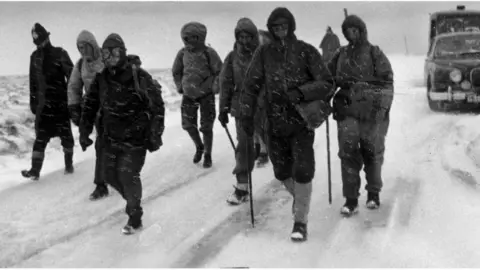 Getty Images
Getty ImagesAs a route that travels through some of England's most spectacular and treacherous terrain celebrates its 200th anniversary, BBC News looks at the chequered history of the notorious Derbyshire road known as the Snake Pass.
Its rapidly-changing conditions, where untamed beauty can turn to bleak isolation within seconds, have caught out many an unwary motorist or fell-walker - and several more experienced ones too.
In March 1964 the area around the Snake Pass was the scene for the annual Four Inns Walk, a tough 50-mile (80km) fell race through the Peak District organised by the Scout Association.
The event attracted competitors from all over the country with young Rover Scouts keen to pit their adventurous spirits against the region's tough terrain.
But as the 1964 event progressed, it was clear the weather forecast had called things wrong.
"What should have been a reasonable sort of day became a nasty one where wind and rain turned into snow," said Roger Bennett, historian and archivist with the Buxton Mountain Rescue team.
"It drove the parties in the wrong direction down a steep-sided valley."
 Eric Rothery
Eric RotheryEric Rothery, who was 19 at the time, was competing in a team from the Huddersfield Scouts with two friends - one of whom was another 19-year-old Gordon Withers.
The teenagers had completed the course the previous year but the 1964 event was different.
"We didn't quite make the Snake Pass," Mr Rothery said.
"We took a wrong turn and finished up in a valley."
By this point, Gordon was exhausted and unable to keep going.
"I stayed with him and the other boy went to fetch help," said Mr Rothery.
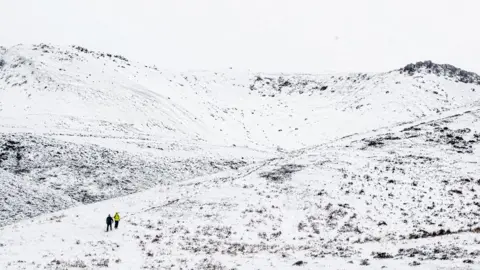 PA Media
PA MediaAlthough a rescue team located them, Gordon passed away in hospital from hypothermia.
"Gordon and I had been at school together," said Mr Rothery.
"We had known each other for eight years. We were very young - just starting off. We thought we could deal with anything.
"We loved the outdoors and had been off in the Peaks a few times.
"But when you talk about that day, the weather changed so quickly.
"We were in strong winds and rain, which turned to snow. The gear we had in those days was different. We were wearing light macs - they were no match for the cold and the wind."
The walk claimed the lives of another two Rover Scouts that day - John Butterfield and Michael Welby, whose bodies were found two days later.
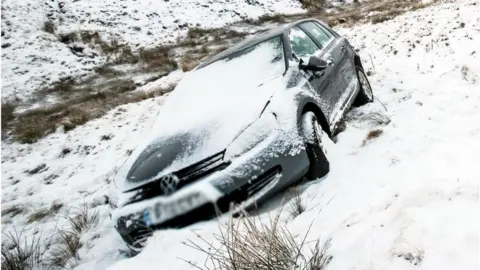 PA Media
PA MediaIn the months that followed the tragedy, it was decided future search and rescue efforts in the area needed to be more co-ordinated.
"Within months of the incident there was a debrief at Whitehall, with police and Peak Park representatives involved," said Mr Bennett.
"It was from that the Peak District Mountain Rescue Organisation was formed."

The long and winding road
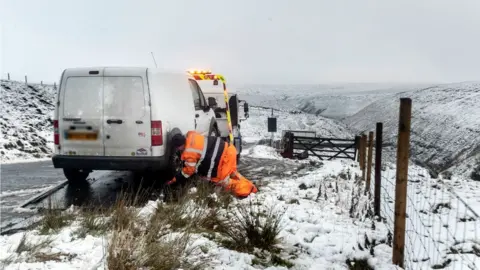 PA Media
PA Media- The Snake Pass was created in 1821 from a series of footpaths and tracks to form a link between Manchester and Sheffield.
- Its name derives not, as many think, from its winding nature but from the serpent on the arms of the Duke of Devonshire, which gave its name to a nearby pub The Snake Pass Inn.
- The route was a toll road until 1875, but it always lost money

Today the body - one of the first of its kind to be created in England - acts as an umbrella organisation to the seven mountain rescue teams that operate within the Peak District area.
Each one has around 50 operational members - all volunteers, and a range of technical equipment to support their rescues, including drones and a text system which can identify the location of a casualty via the GPS system in their mobile phone.
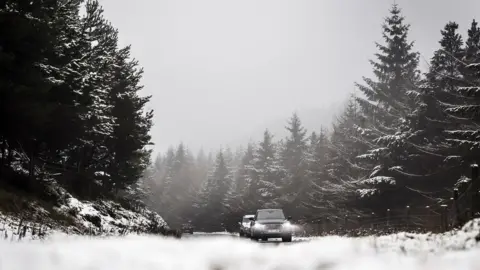 PA Media
PA MediaThe teams still get called out regularly to the Snake Pass in winter months to track down trapped motorists and missing walkers.
"What catches people out is that there's about a 300m (984ft) height difference from one side to the other and the weather can change very quickly," said Mr Bennett.
"But at one flick of a key, a text goes out to everybody on the team and we can get organised rapidly.
"The idea is that if something spirals, you can turn out the other teams very quickly or call for extra resources like search dogs or a helicopter.
"The result is that fatalities are very rare nowadays and certainly there has never been any repeat of an incident on the scale of the Four Inns tragedy."

Follow BBC East Midlands on Facebook, Twitter, or Instagram. Send your story ideas to [email protected].
